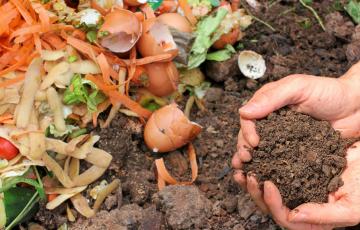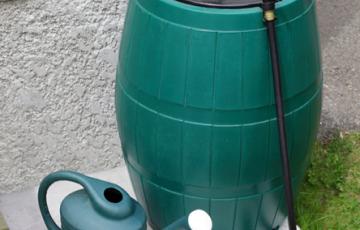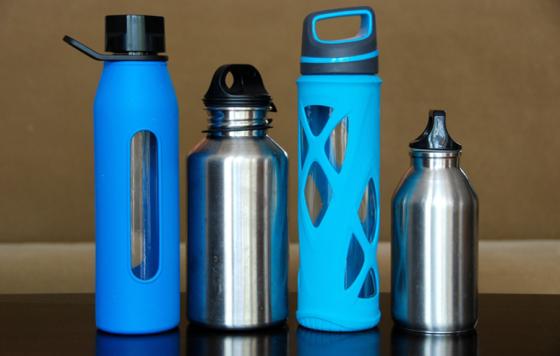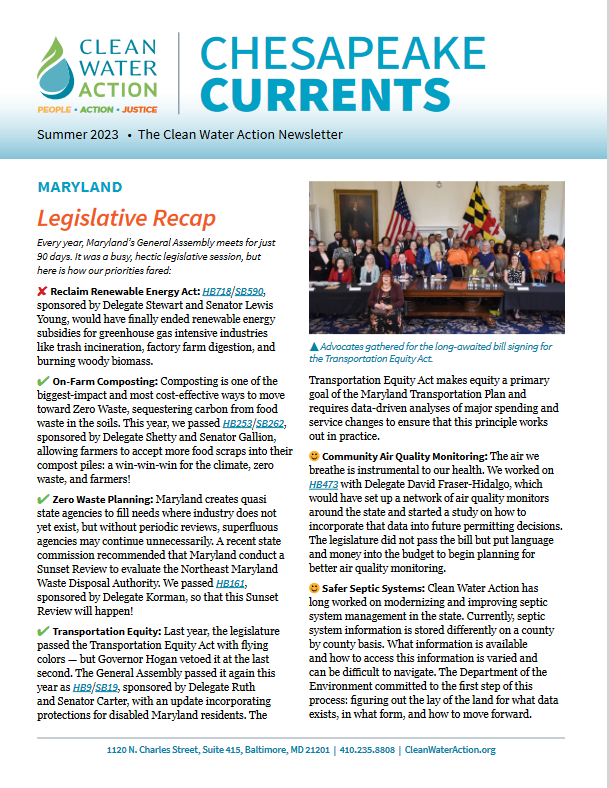In this Issue:
Maryland
District of Columbia
MARYLAND
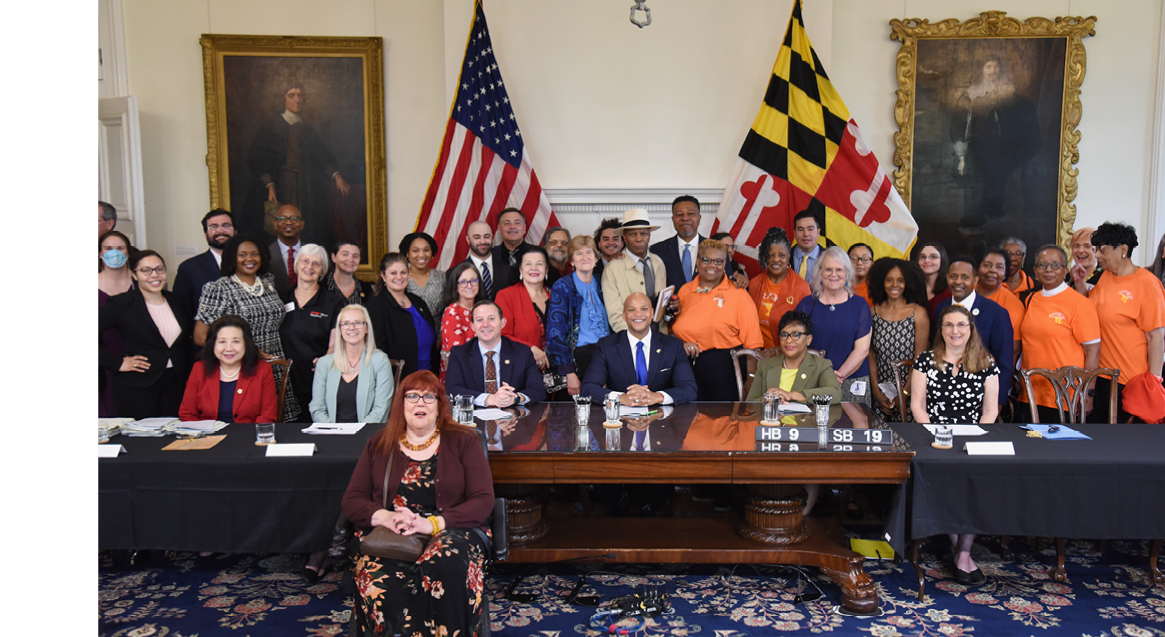
Advocates gathered for the long-awaited bill signing for the Transportation Equity Act.
Every year, Maryland’s General Assembly meets for just 90 days. It was a busy, hectic legislative session, but here is how our priorities fared:
Reclaim Renewable Energy Act: HB718/SB590, sponsored by Delegate Stewart and Senator Lewis Young, would have finally ended renewable energy subsidies for greenhouse gas intensive industries like trash incineration, factory farm digestion, and burning woody biomass.
On-Farm Composting: Composting is one of the biggest-impact and most cost-effective ways to move toward Zero Waste, sequestering carbon from food waste in the soils. This year, we passed HB253/SB262, sponsored by Delegate Shetty and Senator Gallion, allowing farmers to accept more food scraps into their compost piles: a win-win-win for the climate, zero waste, and farmers!
Zero Waste Planning: Maryland creates quasi state agencies to fill needs where industry does not yet exist, but without periodic reviews, superfluous agencies may continue unnecessarily. A recent state commission recommended that Maryland conduct a Sunset Review to evaluate the Northeast Maryland Waste Disposal Authority. We passed HB161, sponsored by Delegate Korman, so that this Sunset Review will happen!
Transportation Equity: Last year, the legislature passed the Transportation Equity Act with flying colors — but Governor Hogan vetoed it at the last second. The General Assembly passed it again this year as HB9/SB19, sponsored by Delegate Ruth and Senator Carter, with an update incorporating protections for disabled Maryland residents. The Transportation Equity Act makes equity a primary goal of the Maryland Transportation Plan and requires data-driven analyses of major spending and service changes to ensure that this principle works out in practice.
Community Air Quality Monitoring: The air we breathe is instrumental to our health. We worked on HB473 with Delegate David Fraser-Hidalgo, which would have set up a network of air quality monitors around the state and started a study on how to incorporate that data into future permitting decisions. The legislature did not pass the bill but put language and money into the budget to begin planning for better air quality monitoring.
Safer Septic Systems: Clean Water Action has long worked on modernizing and improving septic system management in the state. Currently, septic system information is stored differently on a county by county basis. What information is available and how to access this information is varied and can be difficult to navigate. The Department of the Environment committed to the first step of this process: figuring out the lay of the land for what data exists, in what form, and how to move forward.
We first started to get involved in compost policy in Maryland after legislators asked us, “But what about the trash?” as we sought to end subsidies for trash incineration as a clean and renewable source. Organic waste is a significant driver of trash-related greenhouse gas emissions — in a trash incinerator it burns as CO2 but in a landfill it breaks down into methane, a potent greenhouse gas.
What is exciting about organic waste, however, is that it can actually be used to sequester carbon (that is, to put carbon into the soil). When organic waste is composted, the new soil amendment is carbon rich and helps build healthier soils.
Compost can also reduce the need for synthetic fertilizers. Compost has a wide variety of nutrients that plants need to grow, and it can be applied to fields instead of synthetic fertilizer. Many farmers are very interested in this switch to compost, especially as synthetic fertilizer prices have skyrocketed in recent years. Plus, for climate change compost is much better to use than synthetic fertilizers. Synthetic fertilizers are carbon-intensive to create.
Maryland has expanded its on-farm composting permit exemption. Under previous regulations, farmers were allowed to compost manure and on-site generated food scraps using up to 40,000 square feet, but once they accepted off-site generated food scraps (like food scraps from a restaurant or farmer’s market) they were limited to 5,000 square feet (about the area of a basketball court) in support of composting (the piles, storage, equipment, etc). Thanks to legislation spearheaded by Delegate Shetty and Senator Gallion, farmers will now be allowed to have 10,000 square feet (about twice the area of a basketball court) of compost piles with off-site food scraps. This more than doubles the currently allowed food scrap composting and the state has committed to studying the steps for allowing farms to compost food scraps using the entire 40,000 square feet they are allowed to use for manure.
This means that moving forward, farmers will be allowed to accept off-site food scraps and use those food scraps to create compost that they can then use on their farms. Farmers can get income on the front end by accepting food scraps and can reduce expenses on the back end by reducing their need for fertilizers. It allows for compost to be made on a small scale and locally, helping more Maryland farmers diversify their income streams and be a part of the zero-waste economy!
We started with answering how Maryland can reduce the amount of trash it burns or landfills, and we’ve now embarked on an exciting campaign to get Maryland composting.
Stormwater Tips: Did you know? You should avoid contact with waterways (the Bay, streams, rivers, and any flooded areas) 24-48 hours after a large rainstorm. During rainstorms it is not uncommon for areas across Maryland to have sewage overflows, so you want to make sure this hazardous waste is through before you touch it. Also, during rain everything on roads, parking lots, and backyards gets flushed into our waterways — including icky things like pet waste and oil. You can be part of the solution by slowing the flow of water off your property by installing rain barrels, rain gardens, and conservation landscaping.
Compost Webinar: We hope you enjoyed our Compost Webinar held on June 27th and learned how Maryland farmers use compost and how it all fits into a more sustainable system. If you missed it, check out our webinar recording HERE. Discover how compost works, how farmers compost, and how you can compost on your own or use municipal or private compost services to get your food waste into the soil.
Did you know? You should avoid contact with waterways (the Bay, streams, rivers, and any flooded areas) 24-48 hours after a large rainstorm. During rainstorms it is not uncommon for areas across Maryland to have sewage overflows, so you want to make sure this hazardous waste is through before you touch it. Also, during rain everything on roads, parking lots, and backyards gets flushed into our waterways — including icky things like pet waste and oil. You can be part of the solution by slowing the flow of water off your property by installing rain barrels, rain gardens, and conservation landscaping.
DISTRICT OF COLUMBIA
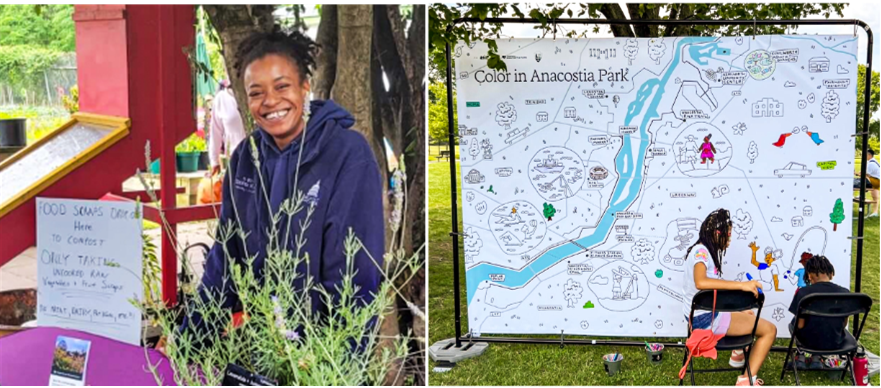
Above: Watts Park clean-up event in June. Right: REI/NPS/Friends of Anacostia Park “Opt Outside” event in July. Did you know Anacostia Park is a national park? This park along the Anacostia River connects communities in DC and Maryland but suffers from a lack of investment resulting in closed bathrooms and crumbling sidewalks. We are diving into the budget as we ask DC and the federal government to invest in park improvements.
APACC: Clean Water Fund is a partner in the Anacostia Park and Community Collaborative. This innovative partnership brings together community leaders and environmental groups to advocate for a healthier Anacostia River and improved park system.
Flood Safe DC: DC has a program to fund home upgrades for residential structures at highest risk of flooding, but funding for the program was not included in the proposed FY 2024 budget. Clean Water and our partners sprang into action to rally comments to the DC Council to preserve funding for the program, just as it is getting off its feet. Why does this matter? Approximately 1,000 residential buildings are in the 100- and 500-year floodplains, and a large majority of the District’s flood-vulnerable single-family homes are in Wards 7 and 8. Fortunately, the DC Council decided to preserve the funding.
Ambient Air Quality: Just like other cities across the country, air pollution in DC has an unequal impact. Air quality tends to be worse in communities with higher percentages of people of color and low-income households — for DC this means that air quality is worst in Wards 7 and 8. DC needs to increase its monitoring sites, especially in Wards 7 and 8, to better inform local disparities in air quality and develop a targeted action plan.
Electrifying Appliances: As recently reported in the news, gas appliances are significant indoor air quality pollutants. Gas infrastructure contributes to global warming with leaks. DC is considering a program to help low-income residents replace their existing gas appliances with efficient electric appliances.
Bottle Deposit: Bottle deposit programs are a great way to increase recycling rates and reduce litter. Many other states already have a bottle deposit, where consumers pay a nominal fee when they purchase beverages and then get the money back when they return the bottle. We have joined the 3R coalition to support the creation of a bottle deposit program in DC!
Summer with Clean Water Living
As school lets out and we all get ready for summer, here are some simple tips for Clean Water living:
Mosquitos
- Eliminate standing water. If you cannot, use mosquito dunk granules or discs.
- Use fans outdoors — mosquitos are weak flyers and a fan can keep them away.
- Plant a wide range of mosquito-repelling plants, including basil, catnip, horse mint, lavender, lemongrass, marigolds, rosemary, and thyme.
- Use non-toxic and organic mosquito repellents, including citronella and lemon eucalyptus. Consumer Reports ranked mosquito repellents and lemon eucalyptus repellants are as effective as deet (but for a shorter amount of time — so reapply).
- Minimize exposure by being aware of peak times (dawn and dusk)
- Wear loose, long sleeved clothing and wear light colored clothing instead of dark.
Reusable Water Bottles
- As you head out on your summer adventures, be sure to bring your reusable water bottle! Staying hydrated is important during hot and muggy Mid-Atlantic summers, and by bringing and refilling your water bottle you are reducing plastic waste!
